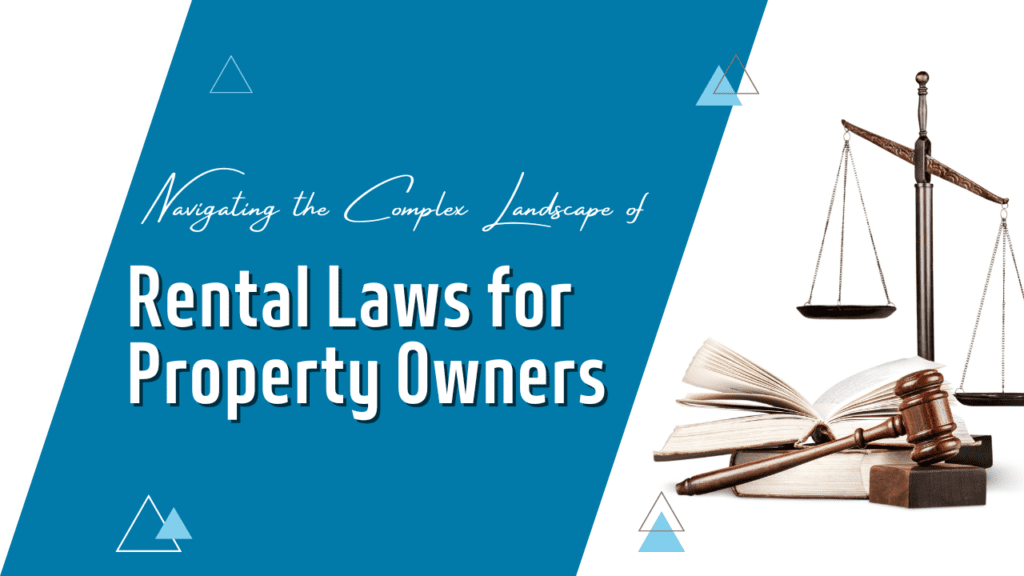
There are many good reasons to invest in San Diego rental properties. This is a high-priced, competitive market full of well-qualified tenants and fueled by a strong local economy and an increasing demand for well-maintained rental homes in desirable neighborhoods.
While there’s a lot to gain by renting out homes in San Diego, there’s also a lot to lose.
The legal risk is real, and that’s due in part to California’s notoriously tenant-friendly rental laws.
If you’re not already working with a San Diego property management company, this is an excellent reason to consider such a partnership. Property managers are very good about staying up to date with the law and the legal requirements that come with investment properties and how you rent them out to tenants.
And the legal landscape is only getting more complex. New laws are being passed all the time, and it’s necessary to remain compliant.
We’ve seen a lot of new landlords and even experienced investors make the legal mistakes that are so easy and, unfortunately, also quite expensive.
Here are some of our best tips for how to navigate the complex legal landscape of San Diego’s rental laws.
Focus on Fair Housing
Fair housing in San Diego covers a lot of protected classes, and there are many ways to violate the law without even realizing it.
California’s statewide fair housing laws are stricter than the federal law. Renting out a home in San Diego, you have to be mindful that your advertising, screening, and management practices do not discriminate against applicants or tenants based on:
- Race
- Color
- Ancestry
- National Origin and Citizenship
- Immigration Status
- Primary Language
- Religion
- Disability
- Sex, gender, and gender identification and expression
- Sexual Orientation
- Genetic Information
- Marital Status
- Familial Status
- Source of Income
- Military or Veteran Status
- Age
One thing that might sneak up on you here is the source of income. The law now requires you to accept applications from Section 8 tenants who expect to use their housing vouchers to document their income.
It’s easy to violate fair housing laws without realizing it. The language you use in your marketing materials or your listings, for example, can inadvertently show preference for one type of a tenant over another. Make sure you’re focused on what makes your property great for every potential tenant, not a specific demographic.
You also want to establish a standard set of qualifying rental criteria before you accept and screen applications. Holding every applicant to the same standard is essential in following fair housing laws. Provide this criteria to potential applicants before they fill out your application and pay an application fee. Many of them will self-screen and realize that either they’re likely to be approved or they won’t meet your standards.
Rent Stabilization and Just Cause Eviction
Unless your property is exempt from rent control laws, including the statewide rent control law that went into effect in 2020, there are limits to how much you can raise the rent from year to year. The state law says you can raise it by five percent plus whatever the Consumer Price Index is set at, not to exceed 10 percent total. Essentially, if your property is included in rent control laws, you’ll never be able to raise the rent more than 10 percent, no matter how the market is performing.
Even if your property is exempt from rent control laws, you have to consider that these limits will impact market rents. If you price your own property too high, you’ll look expensive compared to the competition, and tenants might avoid your rental home.
Navigate this law by first determining whether you’re included in or exempt from rent control laws. Then, make sure your lease agreement reflects it. If you’re exempt from the limits imposed by rent control, your lease agreement must reflect that, otherwise you lose your exemption and you are bound by rent control limits.
With rent control comes just cause eviction. The Tenant Protection Act of 2019 includes rules around eviction. You cannot evict a tenant without cause. Typically, just cause evictions are due to:
- Nonpayment of rent
- Major lease violations that the tenant refuses to rectify
- Criminal activity happening at the home
If you’re planning to move into the home yourself, or if you need to move your tenants out in order to make major renovations, you can evict them legally, but you’ll have to be prepared to pay your tenant a high relocation fee – typically the equivalent of a month’s rent according to state laws. San Diego city landlords, however, may have to pay a relocation fee that equals two or three times the amount of one month’s rent.
Something specific to San Diego is that the tenant protections around eviction and relocation fees apply to tenants as soon as they move into your home. The higher relocation fees are a way to protect tenants against landlords who may evict their residents to make very minor renovations, and then re-rent the property at a much higher rental rate. It’s a way for landlords to avoid rent control measures.
Providing the Tenant Protection Guide to San Diego Tenants
Thanks to a new tenant protection law passed in the City of San Diego in 2023, you’ll need to provide your tenants with a guide to their rights and protections. This is also available on the San Diego Housing Commission’s website. It basically educates and informs tenants, providing resources that they might need if they run into trouble renting a home. You’ll want to provide this to any new tenant moving into a home that you’re renting out.
Security Deposits and New Limits to What You Can Collect
A new law goes into effect in July of 2024 that limits what you can collect in a security deposit before your tenants move into your property. Previously, you could collect up to the equivalent of two months’ rent in a security deposit for an unfurnished property. For a furnished property, you had the freedom to collect a security deposit that equaled three months of rent.
The new limit is one month. You can only collect a security deposit that’s the equivalent of one month’s rent.
San Diego rental property owners also have to pay attention to timing when it comes to complying with security deposit laws. You’ll have 21 days after a tenant moves out to return the deposit to their forwarding address or their last known address. If you’re withholding any or all of the deposit, you’ll need to provide an itemized list of what was withheld and why.
Remember that you cannot withhold money from the security deposit for normal wear and tear. When a tenant lives in your property, you have to expect that there will be some deterioration during the tenancy. You’re responsible for the light marks on the wall from where furniture was resting. You’ll have to repaint and fill those small nail holes. Damage is different. You can deduct for damage as well as it’s well-documented.
Habitability Laws in California
California has an implied warranty of habitability, and that extends to rental properties in San Diego. Basically, this legally reinforces the responsibility that you already know you have: to provide a rental home to tenants that is safe, habitable, and maintained. You cannot rent out a home that has risks such as mold, pest infestations, and lead paint.
The appliances and systems that you provide in your home, such as your HVAC system and your plumbing and electrical systems, must also be maintained in good working order. To meet habitability standards, you’ll need to provide access to heat and hot water as well as electricity and running water.
When your tenants request a repair, make it right away. You don’t want to give them any reason to believe that you aren’t committed to your responsibilities as a landlord. Keep your home well-maintained when you’re renting it out, not only because it’s required by law, but also because it retains your tenants and protects the value and condition of your investment.
San Diego Property Management Protects You from Legal Liability
 We can list dozens of good reasons to partner with a San Diego property manager. One of the best reasons to hire an experienced management company, however, is to keep you and your property in compliance with all state, local, and federal housing-related laws. Mistakes are easy to make, and they’re often expensive.
We can list dozens of good reasons to partner with a San Diego property manager. One of the best reasons to hire an experienced management company, however, is to keep you and your property in compliance with all state, local, and federal housing-related laws. Mistakes are easy to make, and they’re often expensive.
It’s our job to stay up to date with all of the new legislation and changing requirements. We do it well, and our property managers are well-trained to spot potential problems and proactively put processes in place to keep you out of trouble.
If you have questions about how any of these laws apply to you and your property, please get in touch with us at Chase Pacific Property Management and Real Estate Services. We’re here to help you navigate existing laws and prepare for new ones. We can also share additional best practices to address the current hot-button issues of the day, such as service animals and emotional support animals and organic waste recycling.
